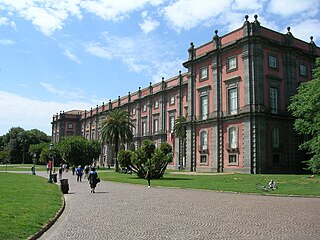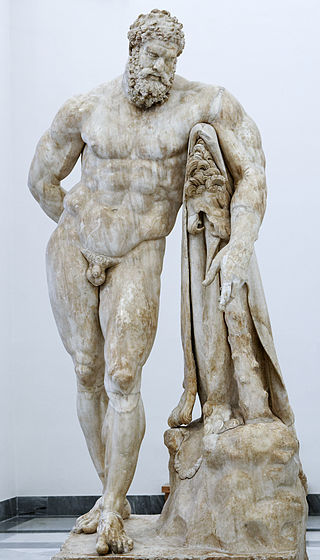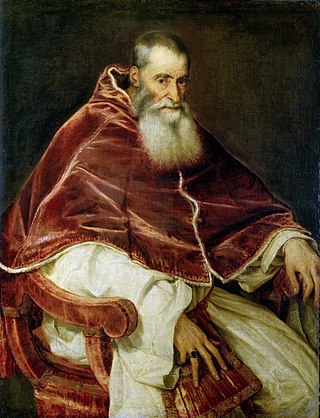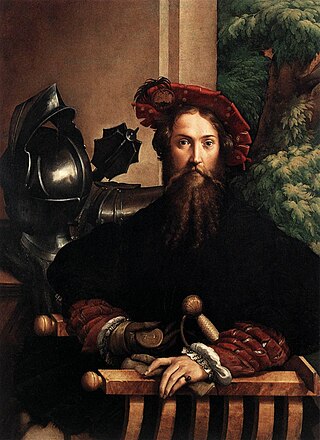
Saint Joseph's Dream is a 1600-1650 oil on canvas painting by Guercino, now in the Royal Palace of Naples. [1]

Saint Joseph's Dream is a 1600-1650 oil on canvas painting by Guercino, now in the Royal Palace of Naples. [1]
It may be a pendant to Jerome , also now in the Palace. [2] It was moved from Parma to Naples with the rest of the Farnese collection in 1734 when the Kingdom of Naples was inherited by Charles of Bourbon. [2] It was recorded in an inventory of the Palace's collections in 1874 but later fell into obscurity.

Palazzo Farnese or Farnese Palace is one of the most important High Renaissance palaces in Rome. Owned by the Italian Republic, it was given to the French government in 1936 for a period of 99 years, and currently serves as the French embassy in Italy.

The Farnese Hercules is an ancient statue of Hercules, probably an enlarged copy made in the early third century AD and signed by Glykon, who is otherwise unknown; the name is Greek but he may have worked in Rome. Like many other Ancient Roman sculptures it is a copy or version of a much older Greek original that was well known, in this case a bronze by Lysippos that would have been made in the fourth century BC. This original survived for over 1500 years until it was melted down by Crusaders in 1205 during the Sack of Constantinople. The enlarged copy was made for the Baths of Caracalla in Rome, where the statue was recovered in 1546, and is now in the Museo Archeologico Nazionale in Naples. The heroically-scaled Hercules is one of the most famous sculptures of antiquity, and has fixed the image of the mythic hero in the European imagination.

Odoardo Farnese was an Italian nobleman, the second son of Alessandro Farnese, Duke of Parma and Maria of Portugal, known for his patronage of the arts. He became a Cardinal of the Roman Catholic Church in 1591, and briefly acted as regent of the Duchy of Parma and Piacenza for his nephew Odoardo from 1622 to 1626.

The National Archaeological Museum of Naples is an important Italian archaeological museum, particularly for ancient Roman remains. Its collection includes works from Greek, Roman and Renaissance times, and especially Roman artifacts from the nearby Pompeii, Stabiae and Herculaneum sites. From 1816 to 1861, it was known as Real Museo Borbonico.

Museo di Capodimonte is an art museum located in the Palace of Capodimonte, a grand Bourbon palazzo in Naples, Italy. The museum is the prime repository of Neapolitan painting and decorative art, with several important works from other Italian schools of painting, and some important ancient Roman sculptures. It is one of the largest museums in Italy. The museum was inaugurated in 1957.

The Royal Palace of Capodimonte is a large palazzo in Naples, Italy. It was formerly the summer residence and hunting lodge of the Bourbon kings of the Two Sicilies, one of the two royal palaces in Naples. Today, it comprises the National Museum of Capodimonte and the Royal Forest. The palace was constructed on its somewhat cooler hilltop location just outside the city, with urban Naples ultimately expanding around it.

The Farnese Gardens, or "Gardens of Farnese upon the Palatine", are a garden in Rome, central Italy, created in 1550 on the northern portion of Palatine Hill, by Cardinal Alessandro Farnese. They were the first private botanical gardens in Europe; the first botanical gardens of any kind in Europe were started by Italian universities in the mid-16th century, only a short time before.

The classical sculptures in the Farnese Collection, one aspect of this large art collection, are one of the first collections of artistic items from Greco-Roman Antiquity. It includes some of the most influential classical works, including the sculptures that were part of the Farnese Marbles, their collection of statuary, which includes world-famous works like the Farnese Hercules, Farnese Cup, Farnese Bull and the Farnese Atlas. These statues are now displayed in the Naples National Archaeological Museum in Italy with some in the British Museum in London.

Portrait of Pope Paul III is a 1543 oil-on-canvas portrait by Titian of Pope Paul III, produced during the pope's visit to Northern Italy. It is in the collection of the Capodimonte Museum, Naples, southern Italy.

Portrait of Galeazzo Sanvitale (1524) is a painting of the condottiero Gian Galeazzo Sanvitale by the Italian late Renaissance artist Parmigianino. It is housed in the National Museum of Capodimonte, Naples, Italy.

El Soplón or Boy Blowing on an Ember is a 1571-1572 oil on canvas painting by El Greco, produced during his stay in Rome and inspired by a passage in Pliny the Elder's Naturalis historia. It and Portrait of Giulio Clovio are among the first of his paintings of figures. He later re-used the figure for The Fable (1580).

Sacrificial Scene is a grisaille tempera on canvas painting by Pontormo, produced around 1520 and now in the National Museum of Capodimonte in Naples. It was probably originally produced as part of the decoration of an interior in honour of Cosimo de' Medici.

Pietà is a c. 1600 oil on canvas painting by Annibale Carracci, the earliest surviving work by him on the subject, which was commissioned by Odoardo Farnese. It moved from Rome to Parma to Naples as part of the Farnese collection and is now in the National Museum of Capodimonte in Naples. It is one of many 16th century Bolognese paintings dedicated to the theme of the Pietà, and it is counted among Carracci's masterpieces.

Lucretia is a 1540 oil on panel painting of Lucretia by Parmigianino, originally in the Farnese collection and now in the Museo nazionale di Capodimonte in Naples.

The Mystic Marriage of St Catherine is a c.1585 oil on canvas painting by Annibale Carracci, now in the Gallerie Nazionali di Capodimonte in Naples, Italy. The composition and sfumato effect owe much to Corregio, particularly the latter's painting of the same subject now in the Louvre.

Penitent Magdalene is a c. 1550 oil on canvas painting by Titian, now in the Museo di Capodimonte in Naples.

Portrait of Cardinal Alessandro Farnese is a c. 1545 – 46 oil on canvas three-quarter-length portrait of Alessandro Farnese the Younger (1520-1589) by Titian, now in the Museo nazionale di Capodimonte in Naples.

Portrait of Pope Paul III with Camauro is a 1545 – 1546 oil on canvas painting by Titian, now in the Museo nazionale di Capodimonte in Naples.

Portrait of Charles V or Portrait of a Man Wearing the Order of the Golden Fleece is a c. 1533-1535 oil on canvas painting by Titian, now in the Museo di Capodimonte in Naples.

Saint Jerome or Penitent Saint Jerome is a c.1640-1650 oil on canvas painting by Guercino, now in the Royal Palace of Naples.